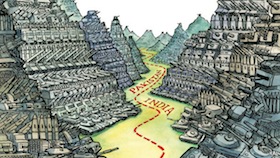The Urgent Need to Defuse India-Pakistan Tensions
May 23, 2011
Featured Image
Today's top nuclear policy stories, with excerpts in bullet form.
Stories we're following today: Monday, May 23, 2011.
The World's Most Dangerous Border - The Economist [link]
- To reduce the risk of terror, the West must help defuse tension between India and Pakistan
- Nervous subcontinentals used to reassure themselves that neither side could use a nuclear weapon because the aggressor would suffer from the fallout. That may no longer hold…
- Pakistan’s militants are evidently keen to show that Islamist terror will survive bin Laden’s death, and—unlike the cold war—there is scope for terrorists either to provoke a nuclear conflict or to explode a dirty nuclear device.
- Pakistan has to make more effort to stop a terror group scuppering talks for a second time; India, to help Pakistan give up its claim to Indian-held Kashmir, needs to pull its army out, grant plenty of autonomy and stop shooting schoolboys who lob stones at its soldiers.
Russia Seeks Pledge From NATO on Missile Defense - Judy Dempsey in The New York Times [link]
- Russian Foreign Minister Sergey] Lavrov said Russia wanted “some kind of written guarantees from NATO that [its missile defenses] will not threaten Russia.”
- “This is about cooperation, not confrontation, about discussing concrete projects,” said [German Foreign Minister Guido] Westerwelle.
Hearing on the Missile Defense Agency Budget
- Senate Appropriations Subcommittee on Defense
- Lt. Gen. Patrick O'Reilly, Director, Missile Defense Agency.
- Wednesday, May 25 @ 10:30 am
- Audio Webcast on CapitolHearings.org
Old Soviet Nuclear Site in Asia Has Unlikely Sentinel: The U.S. - Ellen Barry in The New York Times [link]
- The classified project [in cooperation between the U.S., Russia, and Kazakhstan] aims to keep terrorists away from what the Soviets left behind in patches of earth and a warren of tunnels that they used for atomic testing: among other things, plutonium and highly enriched uranium that Western scientists fear could be used to build an improvised nuclear device.
- Russia is warily sharing archival material about Soviet-era tests, and the United States is paying to remove or secure weapons-grade material. Kazakhstan is providing the labor, but because it is not a nuclear power, its officials are forbidden from learning exactly what it is that they are guarding.
- With the Soviet collapse...Activity [at the Semipalatinsk Test Site] ended so abruptly that a nuclear device lowered into one tunnel in preparation for a test sat unexploded until 1995, when technicians managed to destroy it without creating a nuclear reaction, according to the National Nuclear Center.
Israel’s Iran dilemma - S. Rob Sobhani in The Washington Times [link]
- While Mr. Netanyahu is right about the existential threat to Israel of a nuclear-armed Iran, he is wrong about advocating a military option. History suggests that the option of a secular Iran should be the focus of U.S.-Israeli dialogue on Iran. Helping secularists in Iran gain control of their country is the best guarantor of Israel’s security dilemma.
Excerpt from Remarks by President Obama at the AIPAC Policy Conference 2011 [link]
- Today, Iran is virtually cut off from large parts of the international financial system, and we’re going to keep up the pressure. So let me be absolutely clear –- we remain committed to preventing Iran from acquiring nuclear weapons.
- Its illicit nuclear program is just one challenge that Iran poses. As I said on Thursday, the Iranian government has shown its hypocrisy by claiming to support the rights of protesters while treating its own people with brutality.
- Moreover, Iran continues to support terrorism across the region, including providing weapons and funds to terrorist organizations.
Israeli Prime Minister Benjamin Netanyahu Addresses a Joint Meeting of Congress [link]
- Tuesday, May 24 @ 11:00 am
- House Chamber, Capitol Building, Washington, DC.



